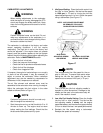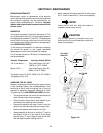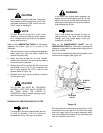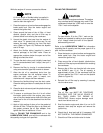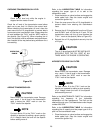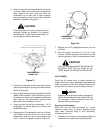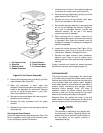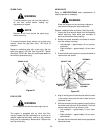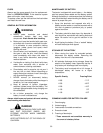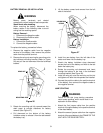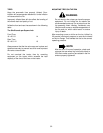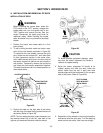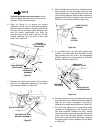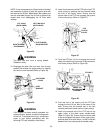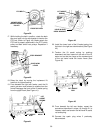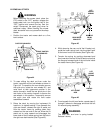
30
FUSES
Always use the same capacity fuse for replacement.
Refer to SPECIFICATIONS. If the electrical system
does not function, check the fuses.
To replace a fuse, pull the old fuse from the fuse holder
and install the new fuse.
GENERAL BATTERY INFORMATION
WARNING
a. Battery posts, terminals and related
accessories contain lead and lead
compounds. Wash Hands after handling.
b. Battery acid must be handled with great care,
as contact with it can burn and blister the skin.
It is advisable to wear protective clothing
(goggles, rubber gloves and apron) when
working with acid.
c. Should battery acid accidentally splatter into
the eyes or onto the skin, rinse the affected
area immediately with clean cold water. If
there is any further discomfort, seek prompt
medical attention.
d. If acid spills on clothing, first dilute it with clean
water, then neutralize with a solution of
ammonia/water or baking soda/water.
e. Since battery acid is corrosive, do not pour it
into any sink or drain. Before discarding an
empty electrolyte container, rinse it thoroughly
with a neutralizing solution.
f. NEVER connect (or disconnect) battery
charger clips to the battery while the charger is
turned on, as it can cause sparks.
g. Keep all sources of ignition (cigarettes,
matches, lighters) away from the battery. The
hydrogen gas generated during charging can
be combustible.
h. As a further precaution, only charge the
battery in a well ventilated area.
Always shield eyes and protect skin and clothing
when working near batteries.
DANGER
BATTERIES CONTAIN SULFURIC ACID AND
MAY EMIT EXPLOSIVE GASES. USE
EXTREME CAUTION WHEN HANDLING
BATTERIES.
KEEP BATTERIES OUT OF THE REACH OF
CHILDREN.
MAINTENANCE OF BATTERY
The tractor is shipped with a wet battery — the battery
acid has already been added and the battery sealed.
Although the battery is maintenance free, the following
care should be taken when handling the battery and to
assure its proper life cycle.
1. Spray the terminals and exposed wire with a
battery terminal sealer, or coat the terminals with a
thin coat of grease or petroleum jelly, to protect
against corrosion.
2. The battery should be kept clean. Any deposits of
acid should be neutralized with baking soda and
water. Be careful not to get this solution in the
cells.
3. Avoid tipping the battery. Even a “sealed” battery
will leak electrolyte when tipped.
STORAGE OF THE BATTERY
1. When storing the tractor for extended periods,
disconnect the battery cables. Removing the
battery from the unit is recommended.
2. All batteries discharge during storage. Keep the
exterior of the battery clean, especially the top. A
dirty battery will discharge itself more rapidly.
3. The battery must be stored with a full charge. A
discharged battery will freeze at a higher
temperature.
Specific Gravity Freezing Point
1.265 –71°F
1.250 –62°F
1.200 –16°F
1.150 5°F
1.100 16°F
COMMON CAUSES FOR BATTERY FAILURE
1. Overcharging
2. Undercharging
3. Loose and/or corroded connections
4. Excessive loads
5. Freezing of electrolyte
* These causes do not constitute warranty in
the event of a battery failure.



